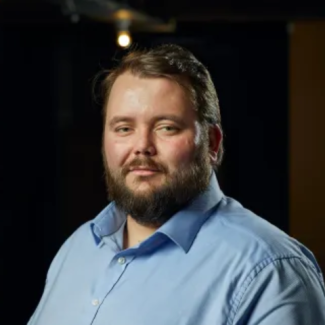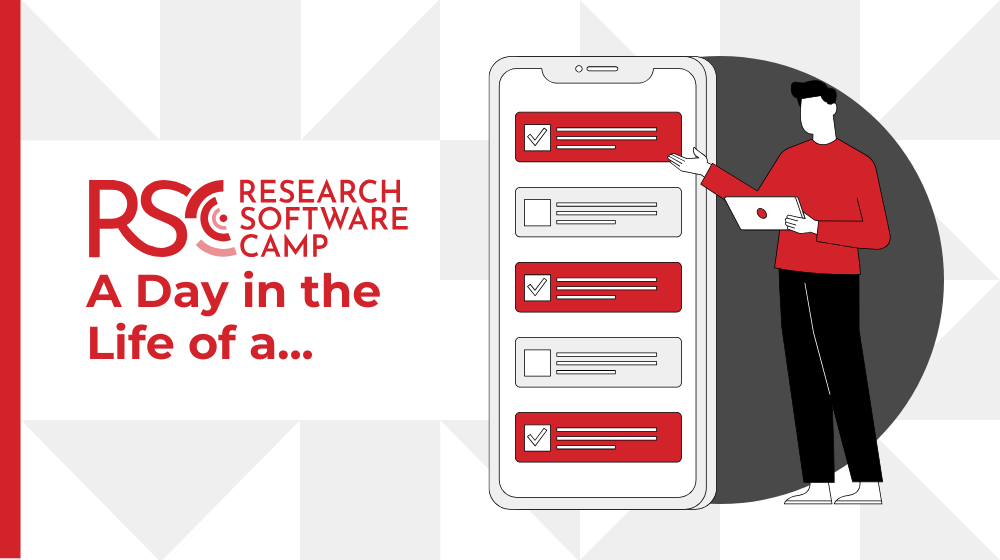As part of the Research Software Camps: Digital Skills for Research Technical Staff, we collaborated with professionals in their field to create a new series titled "A Day in the Life of a...". This series aims to highlight the responsibilities of these roles and provide insight into their daily activities. In this article by Charli Corcoran (University of Edinburgh), we learn more about what a day in the life of a Zebrafish Facility Technician looks like.
Take a usual day in your role, what do you normally do in the mornings? How do you start work?
I normally start work between 9:30 – 10:00 depending on the traffic on my commute in. The lights in the zebrafish facility don't come on till 9am – the fish lay their eggs at sunrise and a lot of the work that goes on in the facility requires eggs. We don't disturb the fish before then as it might affect their willingness to breed, so my day doesn't start before 9am.

One of the aquarium rooms at the Institute of Genetics and Cancer Zebrafish Facility
Every day is different, but generally, I start by checking in on the fish in the facility. We have three rooms, each of which has a recirculating aquaculture system and a whole bunch of other equipment necessary for caring for thousands of small fish. I check in on the fish and the tank systems to make sure everything looks alright. I also check out what baby fish we have in our incubators, to make sure that they are all in the right place and can be taken care of properly through the day. As you can imagine, research involving animals is heavily legislated, so a lot of my job is to make sure that we as a facility are compliant with that legislation. It's important for us to know what is going on so that we can deal with any potential issues before they happen.

The filtration equipment for one of the aquariums at the IGC Zebrafish Facility
Mornings are also time for routine equipment maintenance. Today I spent the morning in our quarantine facility changing the filters and calibrating our monitoring equipment. Doing the tasks in the morning allows time for things to settle afterwards, and for any issues to be solved well before it's time to go home for the day. We like to avoid 3am callouts whenever possible. Maintenance can be anything from changing the mechanical filters and calibrating the probes to testing water quality, and each piece of equipment has its own schedule, so there's always something different to do.
Once equipment maintenance is done, I can check in on any breeding pairs, or tanks that I am hoping to get eggs from. As the fish lay at sunrise, we set up any mating the night before. One way to do this with minimal disturbances to the fish is to put trays of marbles into their tanks. In the wild, zebrafish lay their eggs in shallow water, amongst pebbles and our marbles mimic that environment for them. Once they have laid their eggs, we can remove the tray and collect the eggs. If we have eggs, they then get cleaned and sorted before being put in the incubator to keep them at a constantly warm temperature.
What happens at lunchtime? Do you usually have the same lunch hour?
Lunchtime is variable, and I try to have lunch at a time that suits the work that I have on each day. Some days I can have lunch at 12, and others not until 2. I usually eat lunch at my desk and try to catch up on activities that I do on a voluntary basis – I am the Communications Coordinator for the Technician Steering Committee, so I update the website or scroll through social media to share resources. Today, I have a meeting about the Technician Podcast that I contribute too. I also help out with the online community Zebrafish Rock so that takes up some of my lunch times too.
What do you normally do after lunch?
After lunch, I do the facility welfare checks. This is a task that must be done every day. I check on each fish to make sure that they are healthy and there are no concerns over their welfare. As you can imagine, this can take some time as we have thousands of fish in our facility. We discuss any welfare concerns with the researcher who is responsible for the fish, and any necessary actions are taken.
Once that is done, I try to spend a little bit of time maintaining our rotifer colony and feeding them to our very young fish. Then I can work through whatever might be on my to do list for the rest of the day. Today I have some fish that are now big enough to move from our nursery to the main system, so I will be working on that.
One of the last jobs we do is to set up any breeding tanks, or marbling that might be needed for the next day.

Fish Facility Staff: Charli Corcoran, Cameron Wyatt, Jonny Smith
How do you wrap up work for the day?
There are several tasks that must be done before I have finished work. We have a few spaces in the institute where we are allowed to take fish (usually very young fish) temporarily for things like imaging, so I check those places for any adventurous baby fish that might need a lift back to their incubators, and there are a few incubators that also need checking every day as well. I also give each room a last check, looking for any containers that might need to be topped up, checking on any maintenance done earlier in the day and saying goodnight to the fish. Then I can let myself go home!
What do you enjoy the most about your job?
I think it's possibly quite cliché, but I do enjoy the variety of tasks that my job involves, and the incredible opportunities that I get through it. Last year we ran a workshop at the science festival and I was also able to attend a husbandry workshop in Italy and today I was chatting with pupils at my children's school during their careers assembly. I love that I have the opportunity to do all these things alongside doing work that I enjoy. I'm lucky that I work with a really supportive team – in 2023 the zebrafish team won a CMVM Staff Recognition award for Community Outreach.

Zebrafish Facility Team Charli Corcoran, Cameron Wyatt and Jonny Smith at the CMVM Staff Recognition Awards 2023
What is the hardest part of your job?
I do find it quite hard to switch off from work sometimes. I think that's quite common in jobs that involve caring for animals – just because we've gone home doesn't mean that everything stops in the facility, and I can find it difficult to stop worrying about things that could be happening.
What are some of your hobbies/extracurricular activities?
I like to make clothes when I have free time, especially if there's an event coming up – I'm excited to get started making Christmas party outfits for my children. I also enjoy running but during the winter I find it takes a bit of a backseat to sitting inside in the warmth and sewing instead.
















